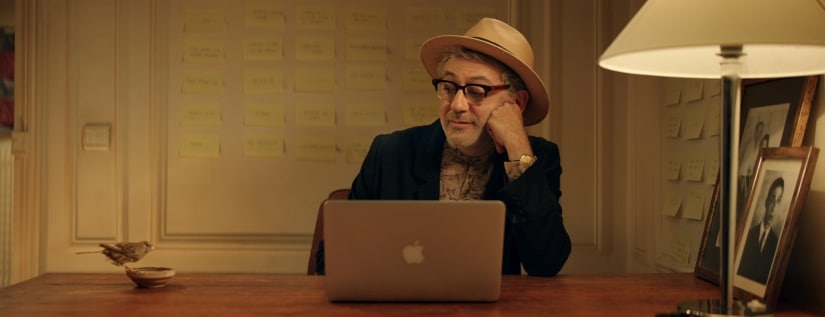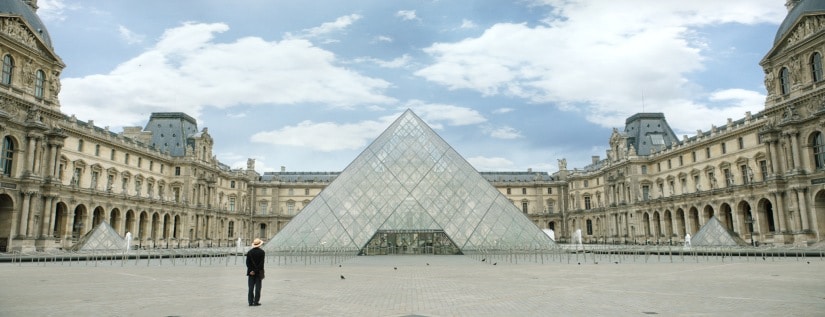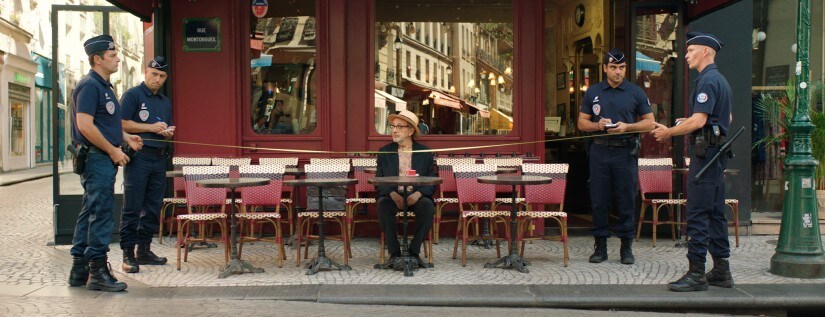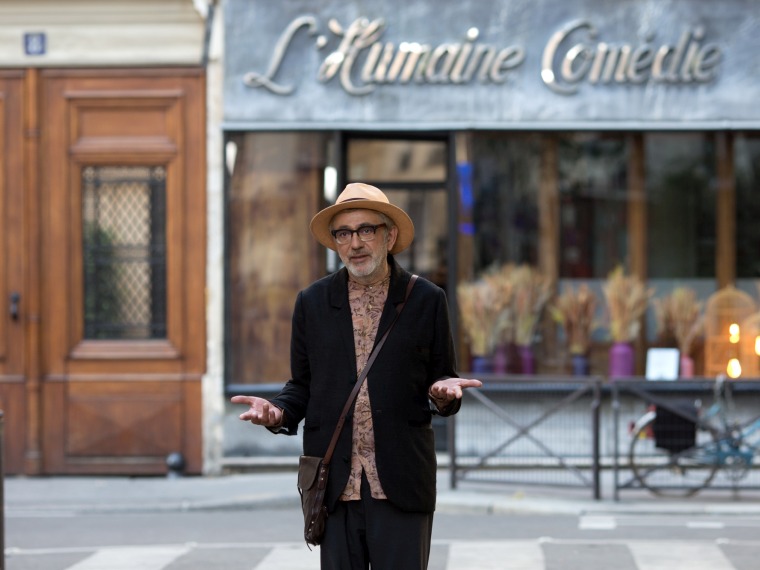“He’s a Palestinian director. But his films are funny,” Gael García Bernal, playing himself in It Must Be Heaven, summarises the career of Elia Suleiman. It’s the conjunction “but”, and the general tenor of the statement that — him being Palestinian and a director of funny films can ever be compatible — Suleiman wants to explore with his latest comedy. [caption id=“attachment_6809801” align=“alignnone” width=“825”] Elia Suleiman and Gael García Bernal in a still from It Must Be Heaven.[/caption] Suleiman’s new film flows before us in a series of carefully constructed situations out of contemporary life filtered through his unique comedic consciousness. Reprising his role as the Nazareth-born ES (his Tatiesque alter-ego), he embarks on a new journey to finance his next film, leaving behind a homeland he no longer recognises for a new one westwards. However, as he travels from Nazareth to Paris to New York, he finds himself in the most bizarre situations which remind him of his own country. The ghost of Palestine seems to be following him like a shadow (or sparrow) wherever he goes. In It Must Be Heaven, Suleiman questions the notions of home and belonging by employing the universal language of comedy. Thus, the film is neither nation-specific nor culture-specific but acts as a synecdoche to much larger national and cultural problems. And he does this by playing the role of a mute observer, guided by a sense of child-like wonder at the world around him. He also turns the audience into observers, challenging us to find a simultaneous beauty, despair and comedy in all the endless absurdities we’ve built around us. Though the film unfolds virtually without words or music, this verbal economy helps emphasise the composition in his set pieces, allowing us to dwell on all the absurd little details of the sequences. So, Suleiman transforms the cities of Nazareth, Paris and New York into caricatured versions of themselves. The action kicks off in the familiar surroundings of Nazareth where Suleiman’s alter ego sees his neighbour trespassing into his garden to steal a few lemons. With each day, the neighbour encroaches little by little until he is soon found watering and pruning the lemon trees as if the garden were his own. Yet, he defends himself, claiming it isn’t stealing because “I knocked on the door, but nobody was there”. This comes right after the opening sequence, where a priest and a religious procession are denied entry into their holy sanctuary by a drunk steward. Not only do these visual gags work as a hilarious indictment of the Israeli settlements, they are also hilarious without the subtext. [caption id=“attachment_6809721” align=“alignnone” width=“825”]
 Elia Suleiman plays his alter-ego ES in It Must Be Heaven.[/caption] If Palestine is hell, it must be heaven elsewhere. When he flies to Paris, we’re first treated to its postcard version. ES sits in a sidewalk cafe as bare-legged women in pretty clothes walk by in slo-mo to the tune of Nina Simone’s ‘I Put a Spell on You’, like it were a commercial for Veet or H&M. With time, La belle ville de Paris loses it poetic allure as Suleiman intentionally turns it into a near unrecognisable ghost town — where the streets are empty and even The Louvre has no tourists around. Instead, we see army tanks rumble past Banque de France and fighter aircrafts zoom overhead. Policemen are chasing troublemakers on Segways and roller-skates when they’re not performing the vital civic duty of ensuring cafe patios are within acceptable dimensions. Black migrants are forced to do petty jobs and the homeless are homeless like in every part of the world. Suleiman executes an intriguing visual transformation of space to showcase ethnoracial segregation, economic marginalisation and police militarisation are not just Palestinian problems. If Paris is heaven, whatever happened to “Liberté, Égalité, Fraternité”? At his next desination of New York, he takes aim at America’s trigger-happy culture. A visit to the boedga turns into an amusing set piece as ES sees each shopper carrying large guns on their shoulders. When he comes out, he realises everyone — from old women to toddlers — in the city is carrying a firearm of some kind. He realises he’d feel a lot safer back home than among the gun nuts in “the land of the free and the home of the brave”. No, New York sure ain’t heaven! [caption id=“attachment_6809691” align=“alignnone” width=“825”]
Elia Suleiman plays his alter-ego ES in It Must Be Heaven.[/caption] If Palestine is hell, it must be heaven elsewhere. When he flies to Paris, we’re first treated to its postcard version. ES sits in a sidewalk cafe as bare-legged women in pretty clothes walk by in slo-mo to the tune of Nina Simone’s ‘I Put a Spell on You’, like it were a commercial for Veet or H&M. With time, La belle ville de Paris loses it poetic allure as Suleiman intentionally turns it into a near unrecognisable ghost town — where the streets are empty and even The Louvre has no tourists around. Instead, we see army tanks rumble past Banque de France and fighter aircrafts zoom overhead. Policemen are chasing troublemakers on Segways and roller-skates when they’re not performing the vital civic duty of ensuring cafe patios are within acceptable dimensions. Black migrants are forced to do petty jobs and the homeless are homeless like in every part of the world. Suleiman executes an intriguing visual transformation of space to showcase ethnoracial segregation, economic marginalisation and police militarisation are not just Palestinian problems. If Paris is heaven, whatever happened to “Liberté, Égalité, Fraternité”? At his next desination of New York, he takes aim at America’s trigger-happy culture. A visit to the boedga turns into an amusing set piece as ES sees each shopper carrying large guns on their shoulders. When he comes out, he realises everyone — from old women to toddlers — in the city is carrying a firearm of some kind. He realises he’d feel a lot safer back home than among the gun nuts in “the land of the free and the home of the brave”. No, New York sure ain’t heaven! [caption id=“attachment_6809691” align=“alignnone” width=“825”] By turning Paris into an empty ghost town, Suleiman shows you can feel like an anonymous outsider even in the busiest of cities.[/caption] By reinterpreting and exaggerating the reality of French and American societies, Suleiman reveals some ugly truths about them — be it police militarism, the national security obsession or gun culture. But he doesn’t want to divide us over sociopolitical issues unique to our countries. Instead, he wants us to acknowledge the comedy in our common anxieties. He wants us to accept that each country can be both heaven and hell at the same time. Just like Palestine. It Must Be Heaven, which saw Suleiman return to Cannes with a Competition entry 10 years after The Time That Remains, showed yet again why he has often been considered a spiritual descendant of Chaplin, Keaton, Lloyd and Tati. Just like these comedy giants, Suleiman illustrates the vagaries of the human condition by embodying a character that wears an indifferent but interrogative expression on his face — even when the world around him is in a sort of lyrical chaos. His humour is mostly visual, rather than audio-visual, moving between simple slapstick and surrealism. So, he gets laughs out of audiences not with dialogue but complex choreographed gags born out of tragicomic situations. His observational inclinations also reveal some socio-political subtext about life in an industrialised, dehumanising society. Of course it was not just the style of comedy but also their attires that turned these masters of comedy into instantly recognisable icons. Chaplin sported a toothbrush moustache; Keaton’s hat was always tipped at a slight angle; Lloyd wore Harry Potter glasses; and Tati was never without his pipe, umbrella and overcoat. Similarly, Suleiman’s black-rimmed glasses, straw hat and sling bag firmly establish his character. [caption id=“attachment_6809711” align=“alignnone” width=“825”]
By turning Paris into an empty ghost town, Suleiman shows you can feel like an anonymous outsider even in the busiest of cities.[/caption] By reinterpreting and exaggerating the reality of French and American societies, Suleiman reveals some ugly truths about them — be it police militarism, the national security obsession or gun culture. But he doesn’t want to divide us over sociopolitical issues unique to our countries. Instead, he wants us to acknowledge the comedy in our common anxieties. He wants us to accept that each country can be both heaven and hell at the same time. Just like Palestine. It Must Be Heaven, which saw Suleiman return to Cannes with a Competition entry 10 years after The Time That Remains, showed yet again why he has often been considered a spiritual descendant of Chaplin, Keaton, Lloyd and Tati. Just like these comedy giants, Suleiman illustrates the vagaries of the human condition by embodying a character that wears an indifferent but interrogative expression on his face — even when the world around him is in a sort of lyrical chaos. His humour is mostly visual, rather than audio-visual, moving between simple slapstick and surrealism. So, he gets laughs out of audiences not with dialogue but complex choreographed gags born out of tragicomic situations. His observational inclinations also reveal some socio-political subtext about life in an industrialised, dehumanising society. Of course it was not just the style of comedy but also their attires that turned these masters of comedy into instantly recognisable icons. Chaplin sported a toothbrush moustache; Keaton’s hat was always tipped at a slight angle; Lloyd wore Harry Potter glasses; and Tati was never without his pipe, umbrella and overcoat. Similarly, Suleiman’s black-rimmed glasses, straw hat and sling bag firmly establish his character. [caption id=“attachment_6809711” align=“alignnone” width=“825”] In It Must Be Heaven, Suleiman also highlights how police militarism is becoming a global concern.[/caption] When ES meets a French producer in Paris to raise finance for his next film, he dismisses it because it’s “not Palestinian enough” and its story could have been set “anywhere in the world”. The American producer he meets in New York finds the fact that he is making “a comedy about peace in the Middle East” itself funny. But even she dismisses it because it doesn’t fit in with Hollywood’s version of Palestine — forever a scene of war, bloodshed and mayhem — or the Middle East, forever a haven for Islamic fundamentalists, belly dancers, and rich oil sheikhs in turbans and long white robes. But that’s exactly his point. Palestinians are defined by more than just their country’s tragic history and the West’s ignorant notions. As we witness in the film’s resonant final scene, they can drink, dance and party like the rest of us. Only, as ES’s compatriot so poignantly remarks, “Everyone drinks to forget; Only Palestinians drink to remember.” It Must Be Heaven had its world premiere at the 2019 Cannes Film Festival. It was one of 21 titles competing for the prestigious Palme d’Or. It won the FIPRESCI Prize for Best Film In Competition.
In It Must Be Heaven, Suleiman also highlights how police militarism is becoming a global concern.[/caption] When ES meets a French producer in Paris to raise finance for his next film, he dismisses it because it’s “not Palestinian enough” and its story could have been set “anywhere in the world”. The American producer he meets in New York finds the fact that he is making “a comedy about peace in the Middle East” itself funny. But even she dismisses it because it doesn’t fit in with Hollywood’s version of Palestine — forever a scene of war, bloodshed and mayhem — or the Middle East, forever a haven for Islamic fundamentalists, belly dancers, and rich oil sheikhs in turbans and long white robes. But that’s exactly his point. Palestinians are defined by more than just their country’s tragic history and the West’s ignorant notions. As we witness in the film’s resonant final scene, they can drink, dance and party like the rest of us. Only, as ES’s compatriot so poignantly remarks, “Everyone drinks to forget; Only Palestinians drink to remember.” It Must Be Heaven had its world premiere at the 2019 Cannes Film Festival. It was one of 21 titles competing for the prestigious Palme d’Or. It won the FIPRESCI Prize for Best Film In Competition.
(All images courtesy Wild Bunch)


)
)
)
)
)
)
)
)
)



